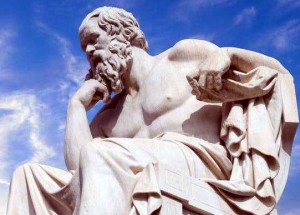 Besides to philosophical genres, philosophers also turned to historical genres. We would like to focus our attention on several genres in the works of Aristotle and Niccolo Machiavelli – the politico-philosophical treatise and historical chronicles that are closely intertwined in the work of philosophers.
Besides to philosophical genres, philosophers also turned to historical genres. We would like to focus our attention on several genres in the works of Aristotle and Niccolo Machiavelli – the politico-philosophical treatise and historical chronicles that are closely intertwined in the work of philosophers.
Analyzing the works of Aristotle (“Constitution of the Athenians” and “Politics”) and N. Machiavelli (“The Prince”, “Discourses on the First Ten Books of Titus Livy”, “Florentine Histories”), we recorded a distinction between such works as “Constitution of the Athenians” and “Politics” by Aristotle or “The Prince” and the “Florentine Histories” by N. Machiavelli, although many modern researchers in their work does not consider these differences: they call all the works mentioned “treatises”, defining these “treatises” as “political”.
We consider the work of Aristotle “Constitution of the Athenians” and N. Machiavelli “Florentine Histories”, which we understand as “historical chronicles”; the work of Aristotle “Politics” and N. Machiavelli “The Prince” and “Discourses on the First Ten Books of Titus Livy”, which we understand as political and philosophical treatises.
Genre politico-philosophical treatise – one of the genres of philosophical literature, and the genre of historical chronicles – one of the genres of historical literature: these genres can exist as separate from each other, and coexist as a single complex. “Constitution of the Athenians” of Aristotle can be represented as a historical work independent of any other works, the purpose of which is to present the state structure of Athens; as a work of particular interest to historical science.
“Politics” of Aristotle can be presented as an independent from the chronicles of an essay revealing politico-philosophical problems; as a work of special interest for philosophy and political science (for many years “Politics” has not been studied in conjunction with other polities, since the texts of the politicians, in particular, the text of the “Constitution of the Athenians”, have not yet been found).
The combination of these genres offers scientists two situations: on the one hand, in aggregate these genres generate a single historical and political-philosophical complex. Within the framework of this complex, it is found that philosophical doctrines can have historical support, and historical examples, such as the experience of city-states, can be applied in the process of theoretical construction of an ideal state; on the other hand, the use by the philosopher of several genres of different directions “generates” genre eclecticism in a single historical and political-philosophical complex, 20 but, despite the existence of eclecticism, this genre interweaving in principle only enriches both philosophy, and history, and political science.
Unlike Aristotle’s works, in which he expounds his thoughts without substantiating concrete practical goals, the Florentine thinker explains why and for what purposes he writes his works. Three directions of genre specificity in N. Machiavelli:
first, the political and philosophical treatise “The Prince” is an absolutely independent philosophical study; historical examples are cited as confirmation of the philosopher’s philosophical views on government;
secondly, “Discourses on the First Ten Books of Titus Livy”, based on the work of historian Titus Livia appears as a political-philosophical treatise, explaining in detail the provisions stated in the work “The Prince “; thirdly, at the heart of the “Florentine Histories ” historical events; for the work is characterized by philosophical explanations, “retreats” N. Machiavelli, but still the historical basis is paramount.
On the basis of the work of Aristotle and Niccolo Machiavelli, we can say that, on the one hand, a philosopher, when writing a politico-philosophical treatise, can appeal to and based on historical works, deduce new ones or argue their own theoretical constructs (“Politiks” , “The Prince”, “Discourses on the First Ten Books of Titus Livy”).
In this case historical chronicles serve as the basis for politico-philosophical treatises. On the other hand, the philosopher, when writing historical chronicles, can apply philosophical provisions, explanations, which represent the basis of his politicophilosophical teaching (“Florentine Histories”).
Author M. Zagurska

Every weekend i used to pay a visit this web site, because i wish for enjoyment,
for the reason that this this web page conations really fastidious funny information too.
bookmarked!!, I love your site!
Thank you for another excellent post. Where
else could anybody get that type of info in such a perfect approach of writing?
I have a presentation subsequent week, and I am at the search for such information.
Awesome post.
Hello, I enjoy reading through your post. I wanted to write a
little comment to support you.
I need to to thank you for this wonderful read!! I certainly enjoyed every bit of it.
I have got you book marked to check out new things you post…
What’s up, the whole thing is going fine here and ofcourse
every one is sharing information, that’s actually good,
keep up writing.
Hello, after reading this remarkable piece of writing i am too delighted to share my experience here with friends.
Hi to every one, it’s genuinely a good for me to go to see this website, it contains valuable Information.